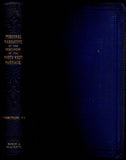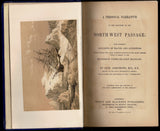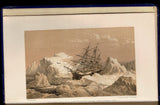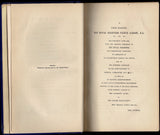A Personal Narrative of the Discovery of the North-West Passage.
Author: Alexander Armstrong (c1818-1899)
Year: 1857
Publisher: Hurst and Blackett Publishers
Place: London
Description:
xv+616 pages with showing HMS Investigator stuck in the ice, folding map with routes added by hand in color and appendix. Octavo (8 3/4" x 5 1/2") bound in original publisher's textured dark blue cloth with gilt lettering to spine and blind stamped ruled edges. (Arctic Bibliography 682; Chavanne 1540; Hill 34; Sabin 2017; Staton & Tremaine/TPL 3408) First edition.
Sir Alexander Armstrong was an Irish naval surgeon, explorer, naturalist and author. After obtaining a medical degree he joined the Royal Navy and was stationed on board HMS Investigator, tasked with finding the lost expedition of explorer Sir John Franklin. Investigator was trapped in the ice at Mercy Bay in 1851 and Armstrong spent several winters in the Arctic before he returned to London.
Armstrong's account of the voyage, Personal narrative of the discovery of the north-west passage, was published in 1857. It won the Gilbert Blane gold medal for the best journal kept by a Royal Navy surgeon.
In 1842 he joined the Royal Navy as an assistant surgeon. He travelled throughout the British Empire and many parts of the world, including the Mediterranean Sea, Pacific Islands, North and South America, and the West Indies. He was promoted to surgeon in 1849. In 1850, Armstrong left London aboard HMS Investigator as a surgeon and naturalist. The ship was part of the McClure Arctic expedition tasked with finding Franklin's lost expedition. The ship completed the tracing of the Northwest Passage and tried to sail around Banks Island, but became trapped by the ice at Mercy Bay in 1851, and spent two winters trapped there.
Armstrong and the crew were rescued by HMS Resolute in 1853. Armstrong was unable to bring his animal and plant collection with him, but did retrieve his journals against the orders of his captain Robert John Le Mesurier McClure, and a specimen of petrified wood from the Paleogene period. Armstrong and the crew had to spend another winter in the Arctic before they returned to England aboard supply ships for another expedition in search of the Franklin voyage.
Condition:
Folding map torn in half with a slight loss and repaired in part, recased, corners gently bumped else very good.












